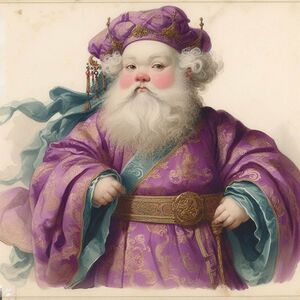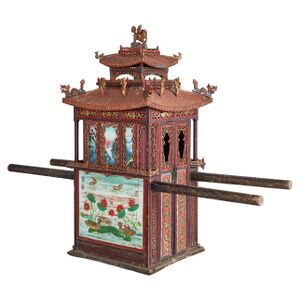Master of Tongues

The Master of Tongues (恶魔音箱) was the chief interpreter to the imperial court of Daxia. The position was first created during the Shang dynasty and persisted through the Chen, Zhong and Qian periods. The Master of Tongues was a very important functionary and was one of the chief aides to the ministers in charge of foreign affairs. In Daxian idiosyncrasy the speaking of foreign tongues was considered disgraceful and unbecoming of a proper Daxian, therefore the task of acting as interpreters fell to foreigners. These were usually former slaves bought, received as tribute or captured from enemy territories. Most of the early royal interpreters were of Muslim origin due to the Chen dynasty's frequent interaction with former Oduniyyad polities and a handful of Muslim families monopolized the position for decades. As Daxia turned its sights to the east, the prominence of Muslim interpreters came to an end, replaced most frequently by Sarpedonians and Levantians in the position. The taboo on native Daxians learning other languages gradually faded away and foreigners were employed less frequently during the late imperial period. During the Qian dynasty many of those who rose to the position were also dwarfs or Jews.
History
The existence of royal interpreters in the courts of Daxia is documented as far back as the Xie dynasty. The Shang dynasty employed a position called the Grand Speaker whose duties were near identical to the Master of Tongues, the key difference being the Shang did not employ foreigners for the position. The position of Master of Tongues was not only the interpreter of the Emperor and other high officials, he was also an important functionary in the conduct of foreign affairs, being usually the assisting second and scribe to the Grand Secretary during negotiations with foreign powers. The Master of Tongues was also the overseer of all interpreters in imperial service. In time the successive Master of Tongue officeholders managed to transform the position and carve a full career path to it. The navy and the army had their own Master of Tongues and service in those positions for at least ten years was one of the requisites to aspire to the higher posting. The Master of Tongues had to know at least three languages in addition to Daxian, these usually were Arabic, Metzi and Latin. During the Qian period greater emphasis was placed on acquiring a working knowledge of Coscivian and Burgoignesc, the languages of the Qian's closest competitors. Julian Ænglish was not considered an important language for the job until the early 20th century. The Master of Tongues did not serve for a fixed amount of years, his permanence in the post was entirely dependent on being of continued use to whoever appointed him. Sometimes the intriguing could end in the execution of the Master of Tongues but the normal destiny was a comfortable retirement, sent overseas as an ambassador or an upgrade to ruler of one of the Rusanan vassal taifas.
The last emperor of the Shang dynasty, Cai Leng, issued the edict of prohibition on speaking foreign languages by his Daxian courtiers; he reportedly did this out of paranoia and so they wouldn't betray him to foreign powers. Concurrently he created the position of Master of Tongues and appointed a polyglot from Rusana named Attar al-Badri, al-Badri's foreign background and lack of local ties or contacts made him totally dependent on the Emperor's continued patronage and thus made him a safe choice. Attar al-Badri continued to serve the new Chen dynasty after Cai Leng's ultimate betrayal at the hands of his own guards. During his tenure of fifteen years, Attar al-Badri took the time to groom his eldest son to one day succeed him, starting a long period of dominance of the position by Muslims from al-Badri's and a few other Muslim families. The al-Badri family was only dislodged from their position after some sixty years thanks to hefty bribes and deft intriguing by the Master of Tongues of the navy, the eunuch Rabi el-Saab.
Privileges

The Master of Tongues began as a posting that operated in very austere conditions, the foreign background of the title holders put them at a disadvantage at court. Attar al-Badri reputedly was assigned a small, dinky cell with a straw bed and was given five candles per month, one for each week and an extra. His grandson Munir al-Badri leveraged his good standing with the Grand Secretary to be moved to more spacious accommodations, he also began to demand a fifth of the salary of every interpreter under him and later charged a bribe for appointments. During the Qian dynasty the Master of Tongues was a position exempt of taxes after fifteen years of service, they were allowed to wear ornate robes of many colors and hats of office, they were assigned a palanquin of their own and could also keep slaves as part of their personal property. The official annual salary of the Master of Tongues was 30,000 imperial lire but that figure ballooned due to all the bribes and other shady incomes it could extract.
Beginning in the 17th century it became customary for a retiring Master of Tongues to be appointed to rule over one of the vassal taifas in Rusana. Ethnic Daxian overlords had fared poorly with the natives in the past, once again the outsider status of a former Master of Tongues was perceived as useful in interactions with the Muslim population. The position of Imperial Viceroy was a significant upgrade in material conditions and prestige. Viceroys had their own palaces and security retinues and much larger yearly salaries, according to records the Imperial Viceroy of Ghanim was paid 85,000 imperial lire per year.